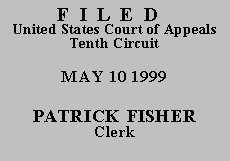

| DAVID ROBIN WHITMORE,
v.
STEVEN KAISER |
No. 99-6015
(D.C. No. 98-CV-464) |
Whitmore appears to argue that he was denied due process at his prison disciplinary hearing and before the district court. Specifically, Whitmore asserts that the hearing officer disregarded his evidence and disregarded applicable procedural rules. See Wolff v. McDonnell, 418 U.S. 539, 563-66 (1974) (identifying due process protections applicable to a prison disciplinary proceeding). He claims that prison officials abused their discretion, acted with bad faith and malice, lied when they accused him of this offense, and had insufficient evidence to convict him. He asserts that a legal assistant lied in a sworn affidavit submitted to the district court. Finally, he claims that the district court improperly deprived him of an opportunity to prove his actual innocence, denied various discovery and other motions, and held him to a stringent pleading requirement.
We agree with the district court's determination that Whitmore's claims concerning the process that he was afforded at the disciplinary hearing are procedurally barred. Whitmore failed to provide the Oklahoma Court of Criminal Appeals with certified records necessary to support his claim for relief in violation of Rule 10.1(C) of the Rules of the Oklahoma Court of Criminal Appeals. Accordingly, the Oklahoma Court of Criminal Appeals denied relief for Whitmore's failure to comply with procedural rules. This is an independent and adequate state ground that bars federal habeas review. See Coleman v. Thompson, 501 U.S. 722, 750 (1991).
The district court correctly concluded that "[t]he Petitioner has not shown that any objective, external factor impeded his efforts to comply with the state's procedural rules; thus, he has not met the cause and prejudice standard" for overcoming this procedural bar. D. Mem. Op. at 5 (citing Coleman, 501 U.S. at 753). Whitmore is also unable to demonstrate the potential for a fundamental miscarriage of justice so as to overcome the procedural bar, see Murray v. Carrier, 477 U.S. 478, 495-96 (1986), because he cannot prove his innocence of the offense alleged. The fact that he was on the telephone until approximately 11:00 p.m. does not preclude him from having joined in the riot thereafter. Nor does Whitmore's telephone defense, plus his disputed assertion that the riot did not last beyond 11:00 p.m., demonstrate his innocence.
Moreover, Whitmore's claims lack merit. While Whitmore was entitled to some due process at his prison disciplinary proceeding, see Mitchell v. Maynard, 80 F.3d 1433, 1444-45 (10th Cir. 1996), prison disciplinary proceedings do not implicate the full range of due process rights that apply to a criminal prosecution. Id. at 1445. Instead, the Constitution requires only that a prisoner receive advance written notice of the charges against him, the right to call witnesses and present evidence if doing so does not jeopardize institutional safety or correction goals, and a written statement of the evidence relied on and the reasons for the disciplinary action. See Superintendent, Mass. Correctional Inst. v. Hill, 472 U.S. 445, 454 (1985). The revocation of good time credits requires only the support of "some evidence in the record." Id. Upon review of the record, we agree with the magistrate's conclusion, adopted by the district court, that Whitmore was afforded all the process he was due.
We further reject Whitmore's claim that his rights were somehow violated by introduction into the record of an affidavit by legal assistant Johnanna Oblesby. Respondents filed Oblesby's affidavit in response to Whitmore's assertion that Oblesby told him that the warden knew he did not participate in the riot. In her affidavit, Oblesby disputes making such a statement. Contrary to Whitmore's assertion, the district court sufficiently inquired into Whitmore's allegation regarding this statement by directing respondents to respond. Moreover, the district court did not violate Whitmore's constitutional rights by crediting this affidavit rather than Whitmore's allegation.
Whitmore's suggestion that the district court violated his due process or other rights in any other respect during these proceedings lacks merit. The district court acted within its discretion when it adopted the magistrate's conclusion that Whitmore was afforded the procedural protections to which he is entitled. The district court did not violate Whitmore's constitutional rights by denying his discovery requests and other motions in light of its determination that Whitmore's claims are procedurally barred and lack merit. Nor does the record support a conclusion that the district court held petitioner to an improperly stringent pleading requirement.
We conclude that Whitmore has not made a substantial showing of the denial of a constitutional right and deny a certificate of appealability. See 28 U.S.C. § 2253(c)(2); Barefoot v. Estelle, 463 U.S. 880 (1983); Fed. R. App. P. 22. We deny leave to proceed in forma pauperis.
This appeal is DISMISSED. The mandate shall issue forthwith.
ENTERED FOR THE COURT
Carlos F. Lucero
Circuit Judge
*.The case is unanimously ordered submitted without oral argument pursuant to Fed. R. App. P. 34(a)(2) and 10th Cir. R. 34.1(G). This order and judgment is not binding precedent, except under the doctrines of law of the case, res judicata, and collateral estoppel. The court generally disfavors the citation of orders and judgments; nevertheless, an order and judgment may be cited under the terms and conditions of 10th Cir. R. 36.3.